University Nursing Assignment: Future of Nursing Practice
VerifiedAdded on 2020/02/24
|7
|1817
|51
Essay
AI Summary
This essay examines the anticipated growth and changes in nursing practice due to healthcare reforms. It explores the shift towards continuity of care, emphasizing holistic patient assessment and socioeconomic factors. The essay discusses the influence of Accountable Care Organizations (ACOs) and patient-centered medical homes on nursing roles, highlighting the need for interprofessional collaboration and cost-saving initiatives. It also incorporates feedback from three nurses, who share their perspectives on the future of nursing in hospital, community, clinic, and medical home settings, focusing on technology integration, patient education, and evidence-based care. The essay concludes by aligning the nurses' impressions with the research findings, emphasizing common themes of role advancement and technological adaptation.
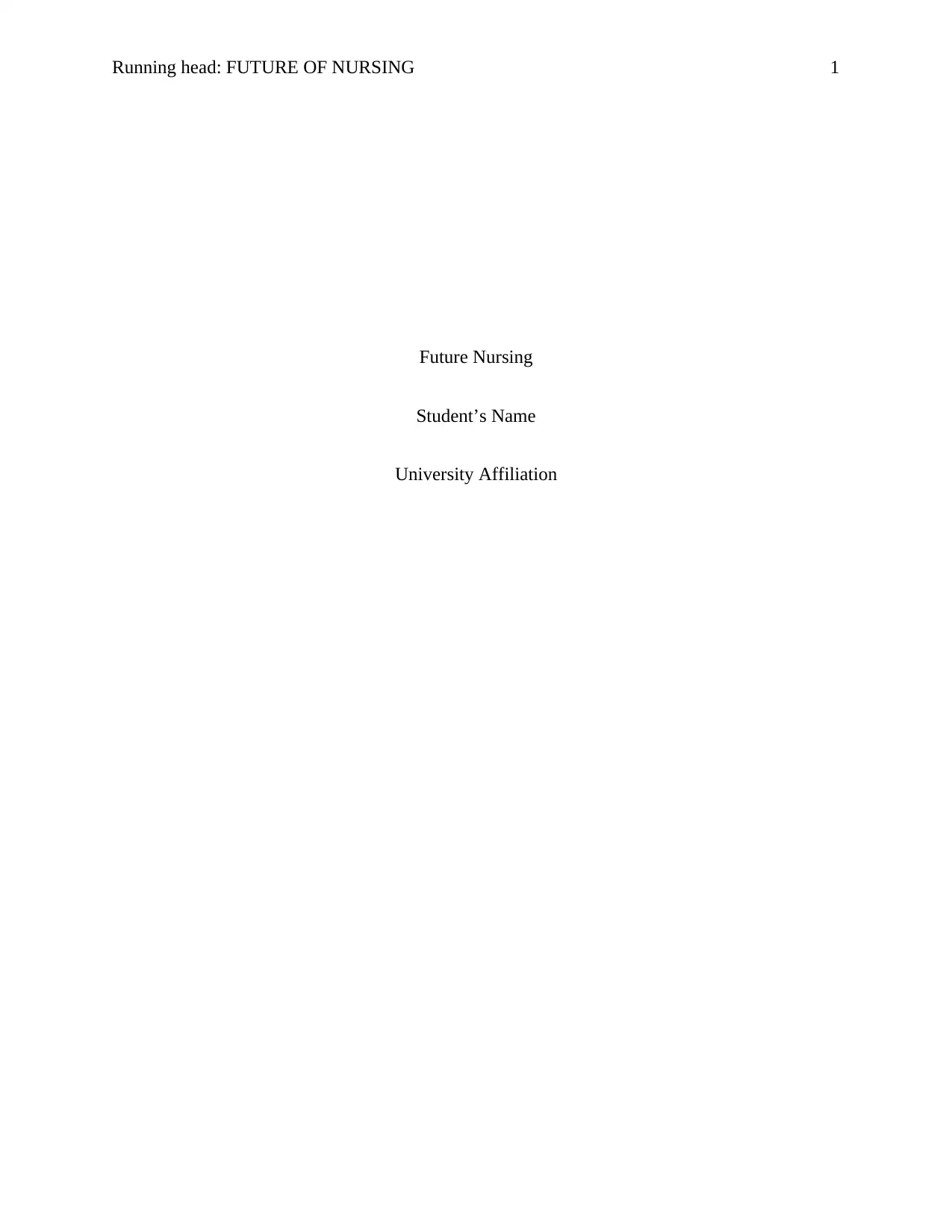
Running head: FUTURE OF NURSING 1
Future Nursing
Student’s Name
University Affiliation
Future Nursing
Student’s Name
University Affiliation
Paraphrase This Document
Need a fresh take? Get an instant paraphrase of this document with our AI Paraphraser
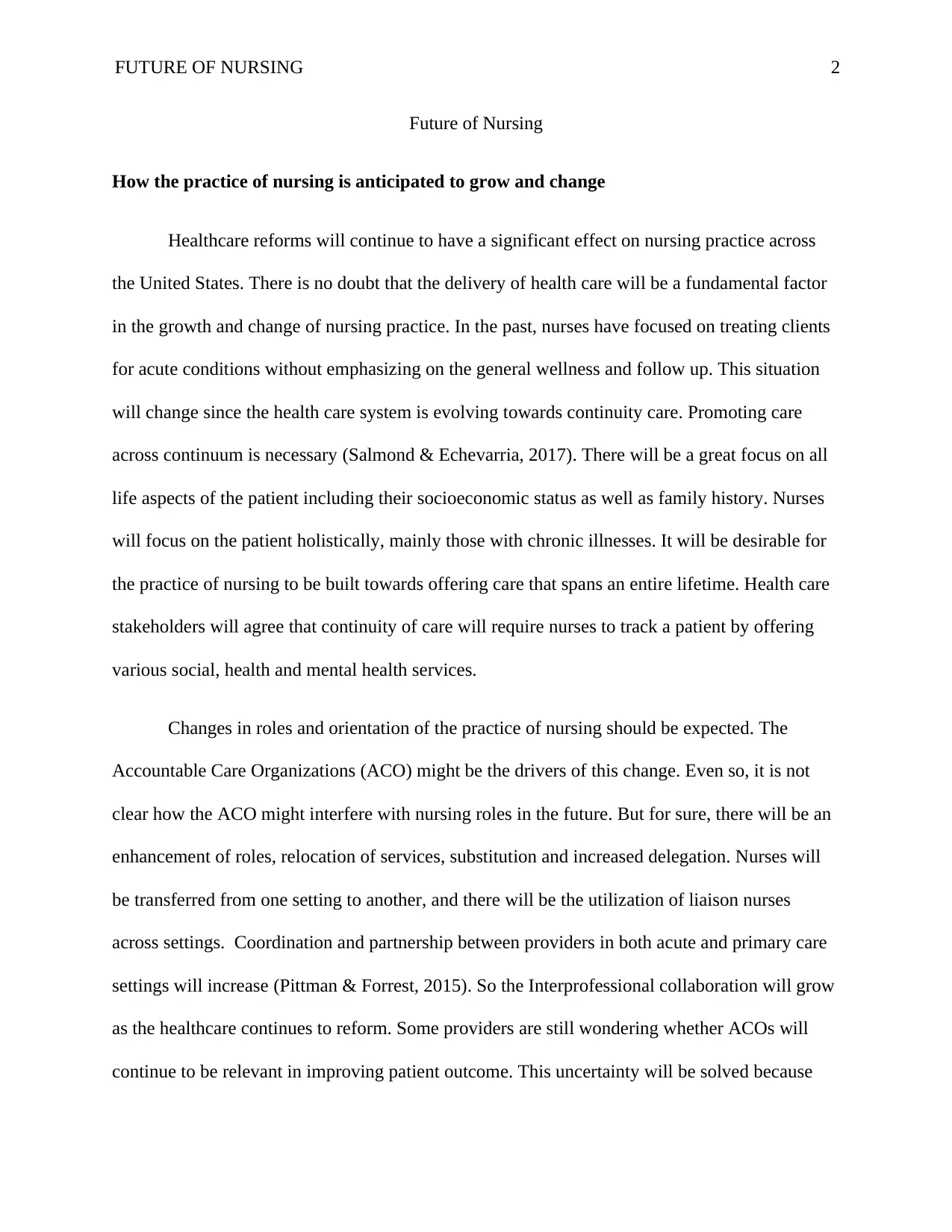
FUTURE OF NURSING 2
Future of Nursing
How the practice of nursing is anticipated to grow and change
Healthcare reforms will continue to have a significant effect on nursing practice across
the United States. There is no doubt that the delivery of health care will be a fundamental factor
in the growth and change of nursing practice. In the past, nurses have focused on treating clients
for acute conditions without emphasizing on the general wellness and follow up. This situation
will change since the health care system is evolving towards continuity care. Promoting care
across continuum is necessary (Salmond & Echevarria, 2017). There will be a great focus on all
life aspects of the patient including their socioeconomic status as well as family history. Nurses
will focus on the patient holistically, mainly those with chronic illnesses. It will be desirable for
the practice of nursing to be built towards offering care that spans an entire lifetime. Health care
stakeholders will agree that continuity of care will require nurses to track a patient by offering
various social, health and mental health services.
Changes in roles and orientation of the practice of nursing should be expected. The
Accountable Care Organizations (ACO) might be the drivers of this change. Even so, it is not
clear how the ACO might interfere with nursing roles in the future. But for sure, there will be an
enhancement of roles, relocation of services, substitution and increased delegation. Nurses will
be transferred from one setting to another, and there will be the utilization of liaison nurses
across settings. Coordination and partnership between providers in both acute and primary care
settings will increase (Pittman & Forrest, 2015). So the Interprofessional collaboration will grow
as the healthcare continues to reform. Some providers are still wondering whether ACOs will
continue to be relevant in improving patient outcome. This uncertainty will be solved because
Future of Nursing
How the practice of nursing is anticipated to grow and change
Healthcare reforms will continue to have a significant effect on nursing practice across
the United States. There is no doubt that the delivery of health care will be a fundamental factor
in the growth and change of nursing practice. In the past, nurses have focused on treating clients
for acute conditions without emphasizing on the general wellness and follow up. This situation
will change since the health care system is evolving towards continuity care. Promoting care
across continuum is necessary (Salmond & Echevarria, 2017). There will be a great focus on all
life aspects of the patient including their socioeconomic status as well as family history. Nurses
will focus on the patient holistically, mainly those with chronic illnesses. It will be desirable for
the practice of nursing to be built towards offering care that spans an entire lifetime. Health care
stakeholders will agree that continuity of care will require nurses to track a patient by offering
various social, health and mental health services.
Changes in roles and orientation of the practice of nursing should be expected. The
Accountable Care Organizations (ACO) might be the drivers of this change. Even so, it is not
clear how the ACO might interfere with nursing roles in the future. But for sure, there will be an
enhancement of roles, relocation of services, substitution and increased delegation. Nurses will
be transferred from one setting to another, and there will be the utilization of liaison nurses
across settings. Coordination and partnership between providers in both acute and primary care
settings will increase (Pittman & Forrest, 2015). So the Interprofessional collaboration will grow
as the healthcare continues to reform. Some providers are still wondering whether ACOs will
continue to be relevant in improving patient outcome. This uncertainty will be solved because
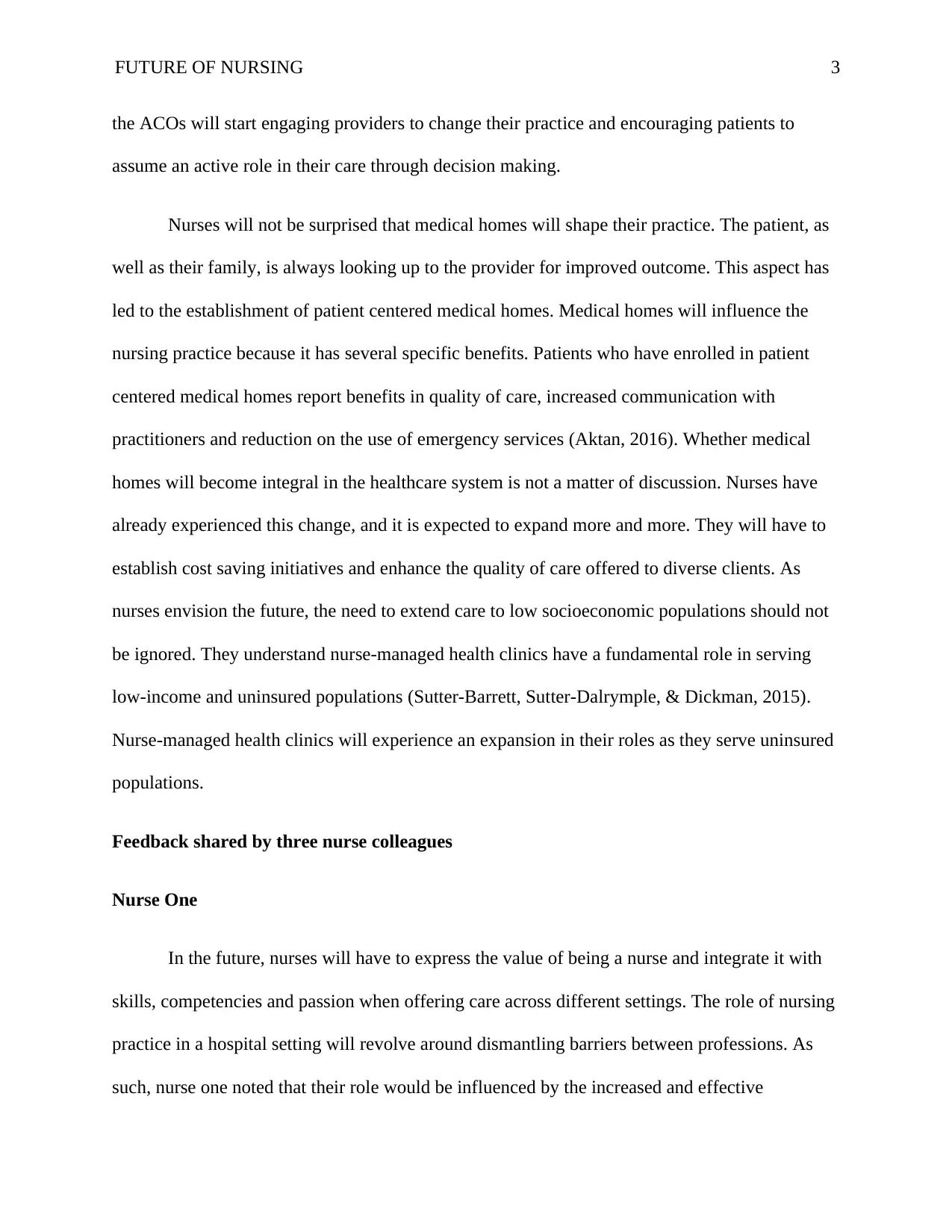
FUTURE OF NURSING 3
the ACOs will start engaging providers to change their practice and encouraging patients to
assume an active role in their care through decision making.
Nurses will not be surprised that medical homes will shape their practice. The patient, as
well as their family, is always looking up to the provider for improved outcome. This aspect has
led to the establishment of patient centered medical homes. Medical homes will influence the
nursing practice because it has several specific benefits. Patients who have enrolled in patient
centered medical homes report benefits in quality of care, increased communication with
practitioners and reduction on the use of emergency services (Aktan, 2016). Whether medical
homes will become integral in the healthcare system is not a matter of discussion. Nurses have
already experienced this change, and it is expected to expand more and more. They will have to
establish cost saving initiatives and enhance the quality of care offered to diverse clients. As
nurses envision the future, the need to extend care to low socioeconomic populations should not
be ignored. They understand nurse-managed health clinics have a fundamental role in serving
low-income and uninsured populations (Sutter-Barrett, Sutter-Dalrymple, & Dickman, 2015).
Nurse-managed health clinics will experience an expansion in their roles as they serve uninsured
populations.
Feedback shared by three nurse colleagues
Nurse One
In the future, nurses will have to express the value of being a nurse and integrate it with
skills, competencies and passion when offering care across different settings. The role of nursing
practice in a hospital setting will revolve around dismantling barriers between professions. As
such, nurse one noted that their role would be influenced by the increased and effective
the ACOs will start engaging providers to change their practice and encouraging patients to
assume an active role in their care through decision making.
Nurses will not be surprised that medical homes will shape their practice. The patient, as
well as their family, is always looking up to the provider for improved outcome. This aspect has
led to the establishment of patient centered medical homes. Medical homes will influence the
nursing practice because it has several specific benefits. Patients who have enrolled in patient
centered medical homes report benefits in quality of care, increased communication with
practitioners and reduction on the use of emergency services (Aktan, 2016). Whether medical
homes will become integral in the healthcare system is not a matter of discussion. Nurses have
already experienced this change, and it is expected to expand more and more. They will have to
establish cost saving initiatives and enhance the quality of care offered to diverse clients. As
nurses envision the future, the need to extend care to low socioeconomic populations should not
be ignored. They understand nurse-managed health clinics have a fundamental role in serving
low-income and uninsured populations (Sutter-Barrett, Sutter-Dalrymple, & Dickman, 2015).
Nurse-managed health clinics will experience an expansion in their roles as they serve uninsured
populations.
Feedback shared by three nurse colleagues
Nurse One
In the future, nurses will have to express the value of being a nurse and integrate it with
skills, competencies and passion when offering care across different settings. The role of nursing
practice in a hospital setting will revolve around dismantling barriers between professions. As
such, nurse one noted that their role would be influenced by the increased and effective
⊘ This is a preview!⊘
Do you want full access?
Subscribe today to unlock all pages.

Trusted by 1+ million students worldwide
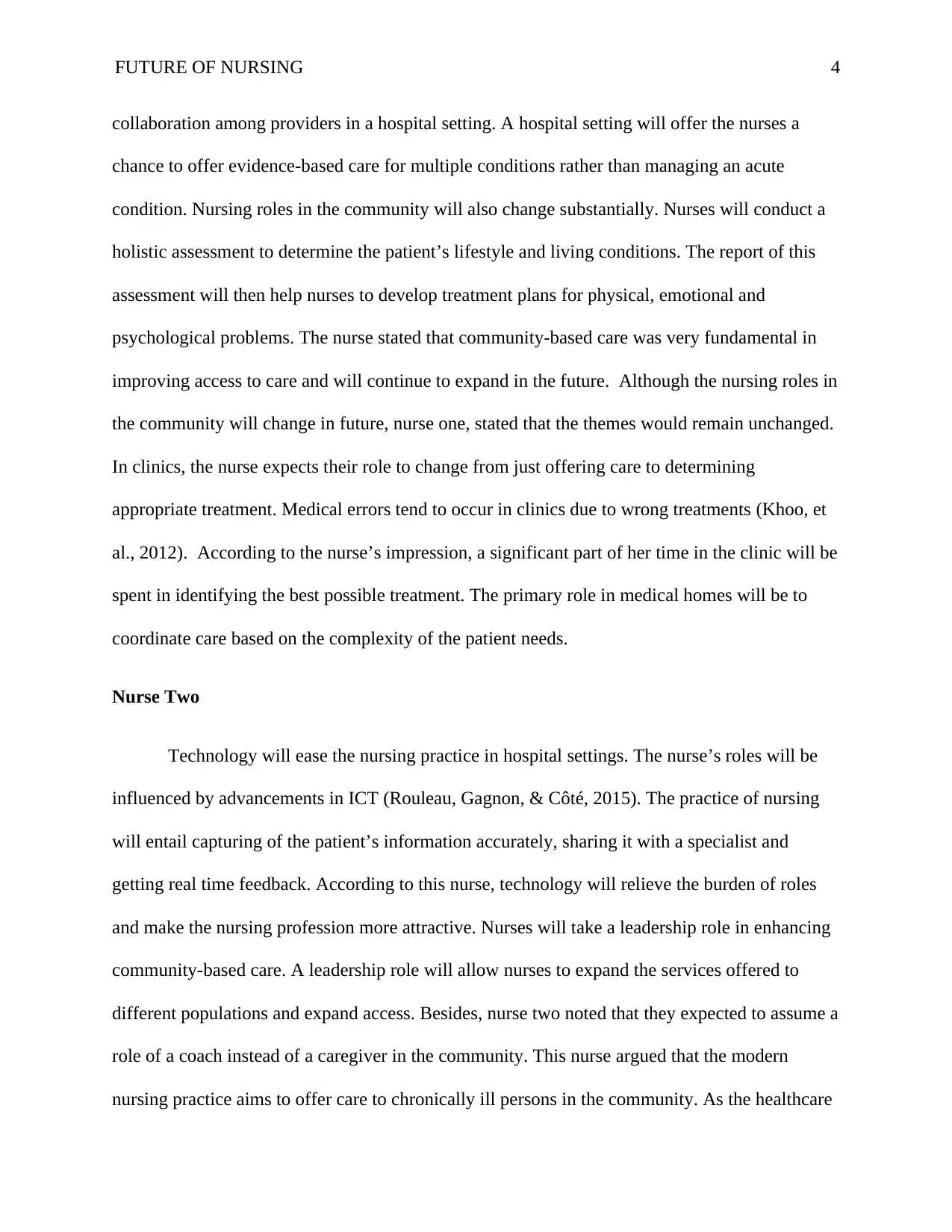
FUTURE OF NURSING 4
collaboration among providers in a hospital setting. A hospital setting will offer the nurses a
chance to offer evidence-based care for multiple conditions rather than managing an acute
condition. Nursing roles in the community will also change substantially. Nurses will conduct a
holistic assessment to determine the patient’s lifestyle and living conditions. The report of this
assessment will then help nurses to develop treatment plans for physical, emotional and
psychological problems. The nurse stated that community-based care was very fundamental in
improving access to care and will continue to expand in the future. Although the nursing roles in
the community will change in future, nurse one, stated that the themes would remain unchanged.
In clinics, the nurse expects their role to change from just offering care to determining
appropriate treatment. Medical errors tend to occur in clinics due to wrong treatments (Khoo, et
al., 2012). According to the nurse’s impression, a significant part of her time in the clinic will be
spent in identifying the best possible treatment. The primary role in medical homes will be to
coordinate care based on the complexity of the patient needs.
Nurse Two
Technology will ease the nursing practice in hospital settings. The nurse’s roles will be
influenced by advancements in ICT (Rouleau, Gagnon, & Côté, 2015). The practice of nursing
will entail capturing of the patient’s information accurately, sharing it with a specialist and
getting real time feedback. According to this nurse, technology will relieve the burden of roles
and make the nursing profession more attractive. Nurses will take a leadership role in enhancing
community-based care. A leadership role will allow nurses to expand the services offered to
different populations and expand access. Besides, nurse two noted that they expected to assume a
role of a coach instead of a caregiver in the community. This nurse argued that the modern
nursing practice aims to offer care to chronically ill persons in the community. As the healthcare
collaboration among providers in a hospital setting. A hospital setting will offer the nurses a
chance to offer evidence-based care for multiple conditions rather than managing an acute
condition. Nursing roles in the community will also change substantially. Nurses will conduct a
holistic assessment to determine the patient’s lifestyle and living conditions. The report of this
assessment will then help nurses to develop treatment plans for physical, emotional and
psychological problems. The nurse stated that community-based care was very fundamental in
improving access to care and will continue to expand in the future. Although the nursing roles in
the community will change in future, nurse one, stated that the themes would remain unchanged.
In clinics, the nurse expects their role to change from just offering care to determining
appropriate treatment. Medical errors tend to occur in clinics due to wrong treatments (Khoo, et
al., 2012). According to the nurse’s impression, a significant part of her time in the clinic will be
spent in identifying the best possible treatment. The primary role in medical homes will be to
coordinate care based on the complexity of the patient needs.
Nurse Two
Technology will ease the nursing practice in hospital settings. The nurse’s roles will be
influenced by advancements in ICT (Rouleau, Gagnon, & Côté, 2015). The practice of nursing
will entail capturing of the patient’s information accurately, sharing it with a specialist and
getting real time feedback. According to this nurse, technology will relieve the burden of roles
and make the nursing profession more attractive. Nurses will take a leadership role in enhancing
community-based care. A leadership role will allow nurses to expand the services offered to
different populations and expand access. Besides, nurse two noted that they expected to assume a
role of a coach instead of a caregiver in the community. This nurse argued that the modern
nursing practice aims to offer care to chronically ill persons in the community. As the healthcare
Paraphrase This Document
Need a fresh take? Get an instant paraphrase of this document with our AI Paraphraser
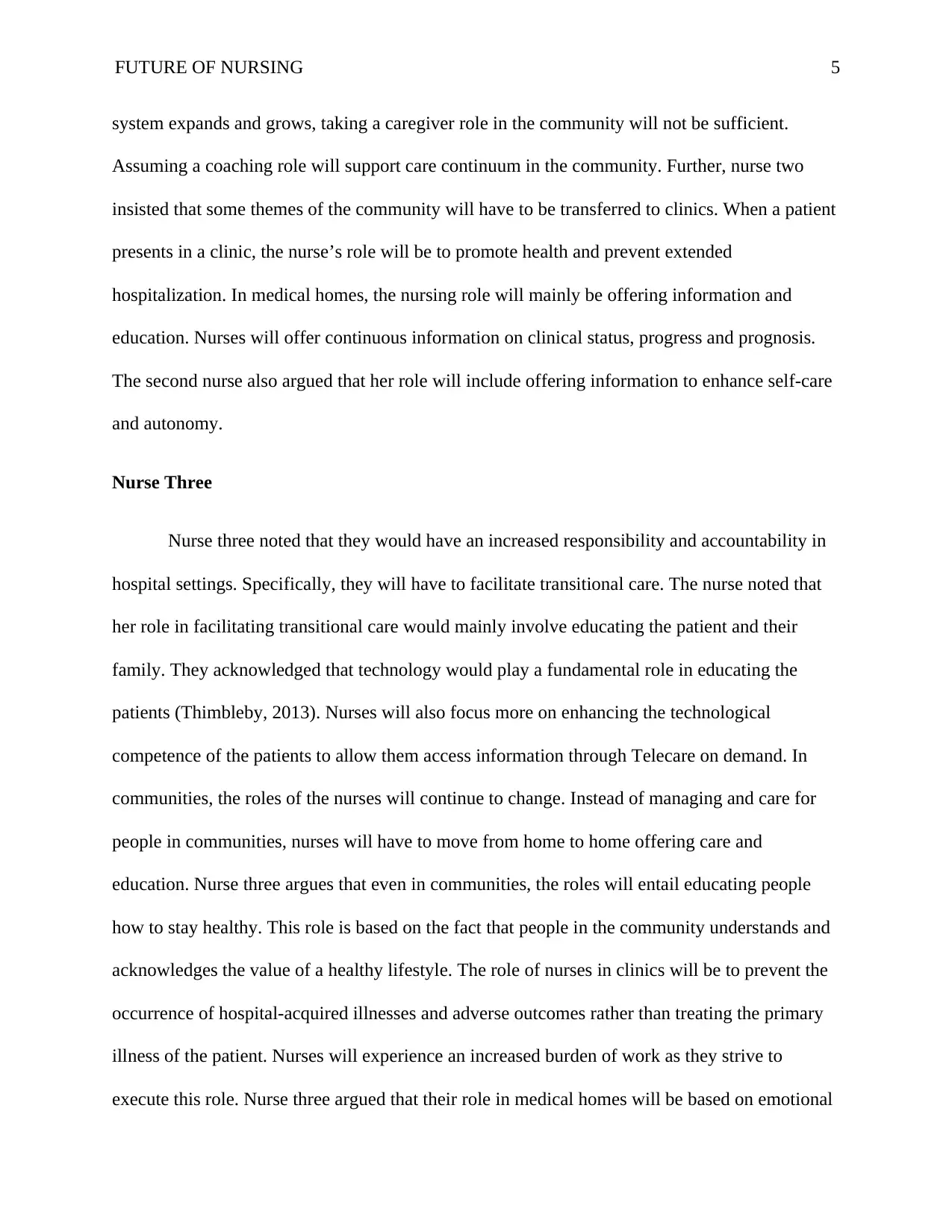
FUTURE OF NURSING 5
system expands and grows, taking a caregiver role in the community will not be sufficient.
Assuming a coaching role will support care continuum in the community. Further, nurse two
insisted that some themes of the community will have to be transferred to clinics. When a patient
presents in a clinic, the nurse’s role will be to promote health and prevent extended
hospitalization. In medical homes, the nursing role will mainly be offering information and
education. Nurses will offer continuous information on clinical status, progress and prognosis.
The second nurse also argued that her role will include offering information to enhance self-care
and autonomy.
Nurse Three
Nurse three noted that they would have an increased responsibility and accountability in
hospital settings. Specifically, they will have to facilitate transitional care. The nurse noted that
her role in facilitating transitional care would mainly involve educating the patient and their
family. They acknowledged that technology would play a fundamental role in educating the
patients (Thimbleby, 2013). Nurses will also focus more on enhancing the technological
competence of the patients to allow them access information through Telecare on demand. In
communities, the roles of the nurses will continue to change. Instead of managing and care for
people in communities, nurses will have to move from home to home offering care and
education. Nurse three argues that even in communities, the roles will entail educating people
how to stay healthy. This role is based on the fact that people in the community understands and
acknowledges the value of a healthy lifestyle. The role of nurses in clinics will be to prevent the
occurrence of hospital-acquired illnesses and adverse outcomes rather than treating the primary
illness of the patient. Nurses will experience an increased burden of work as they strive to
execute this role. Nurse three argued that their role in medical homes will be based on emotional
system expands and grows, taking a caregiver role in the community will not be sufficient.
Assuming a coaching role will support care continuum in the community. Further, nurse two
insisted that some themes of the community will have to be transferred to clinics. When a patient
presents in a clinic, the nurse’s role will be to promote health and prevent extended
hospitalization. In medical homes, the nursing role will mainly be offering information and
education. Nurses will offer continuous information on clinical status, progress and prognosis.
The second nurse also argued that her role will include offering information to enhance self-care
and autonomy.
Nurse Three
Nurse three noted that they would have an increased responsibility and accountability in
hospital settings. Specifically, they will have to facilitate transitional care. The nurse noted that
her role in facilitating transitional care would mainly involve educating the patient and their
family. They acknowledged that technology would play a fundamental role in educating the
patients (Thimbleby, 2013). Nurses will also focus more on enhancing the technological
competence of the patients to allow them access information through Telecare on demand. In
communities, the roles of the nurses will continue to change. Instead of managing and care for
people in communities, nurses will have to move from home to home offering care and
education. Nurse three argues that even in communities, the roles will entail educating people
how to stay healthy. This role is based on the fact that people in the community understands and
acknowledges the value of a healthy lifestyle. The role of nurses in clinics will be to prevent the
occurrence of hospital-acquired illnesses and adverse outcomes rather than treating the primary
illness of the patient. Nurses will experience an increased burden of work as they strive to
execute this role. Nurse three argued that their role in medical homes will be based on emotional
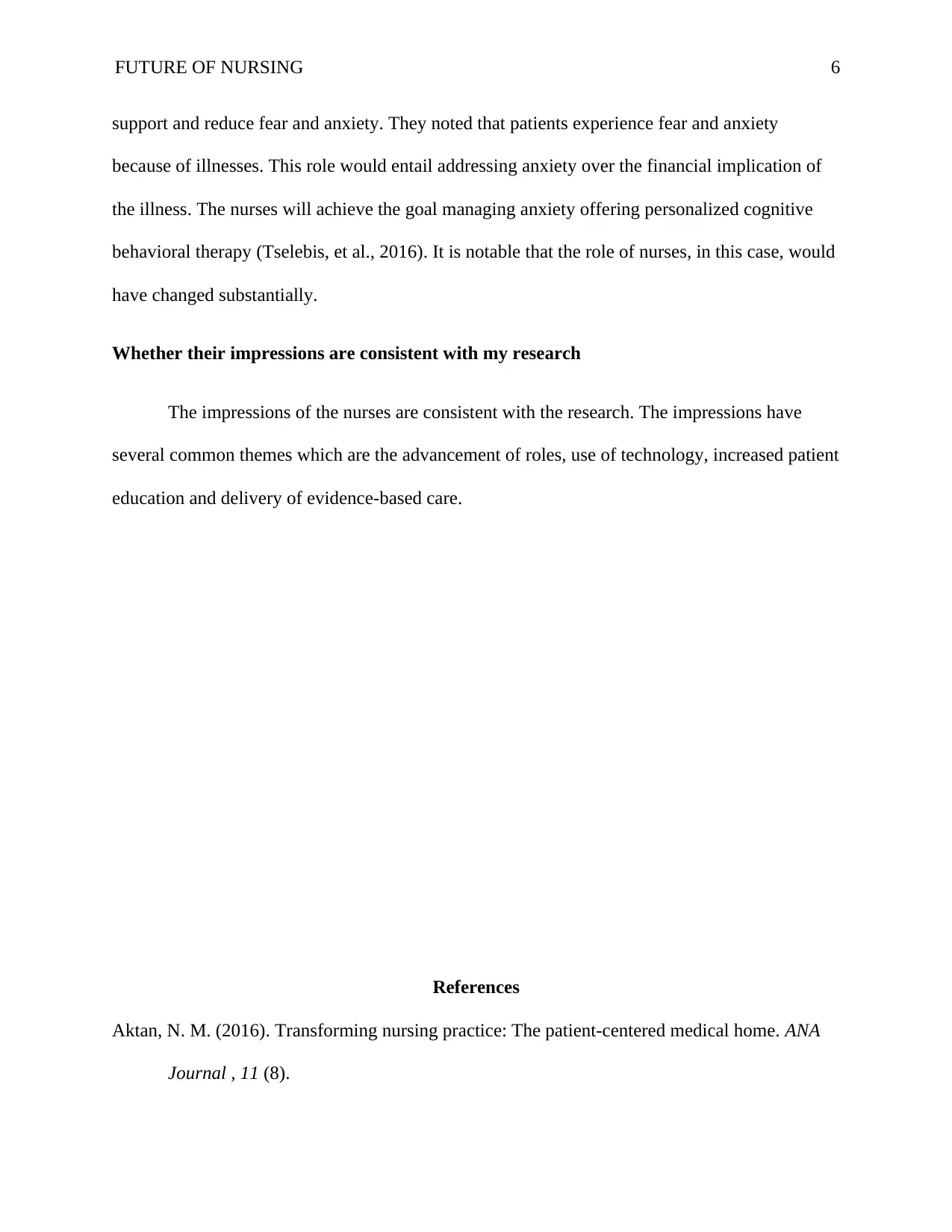
FUTURE OF NURSING 6
support and reduce fear and anxiety. They noted that patients experience fear and anxiety
because of illnesses. This role would entail addressing anxiety over the financial implication of
the illness. The nurses will achieve the goal managing anxiety offering personalized cognitive
behavioral therapy (Tselebis, et al., 2016). It is notable that the role of nurses, in this case, would
have changed substantially.
Whether their impressions are consistent with my research
The impressions of the nurses are consistent with the research. The impressions have
several common themes which are the advancement of roles, use of technology, increased patient
education and delivery of evidence-based care.
References
Aktan, N. M. (2016). Transforming nursing practice: The patient-centered medical home. ANA
Journal , 11 (8).
support and reduce fear and anxiety. They noted that patients experience fear and anxiety
because of illnesses. This role would entail addressing anxiety over the financial implication of
the illness. The nurses will achieve the goal managing anxiety offering personalized cognitive
behavioral therapy (Tselebis, et al., 2016). It is notable that the role of nurses, in this case, would
have changed substantially.
Whether their impressions are consistent with my research
The impressions of the nurses are consistent with the research. The impressions have
several common themes which are the advancement of roles, use of technology, increased patient
education and delivery of evidence-based care.
References
Aktan, N. M. (2016). Transforming nursing practice: The patient-centered medical home. ANA
Journal , 11 (8).
⊘ This is a preview!⊘
Do you want full access?
Subscribe today to unlock all pages.

Trusted by 1+ million students worldwide
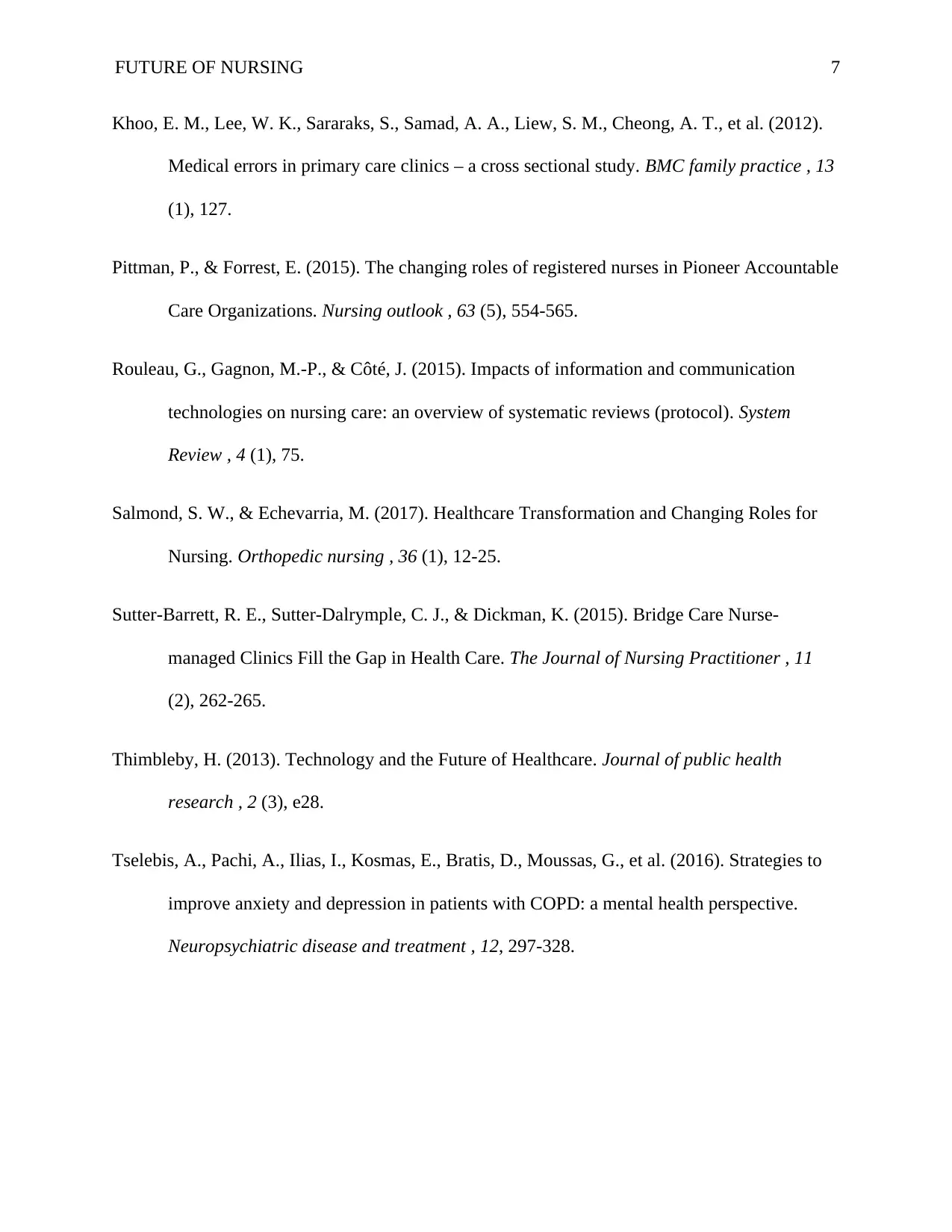
FUTURE OF NURSING 7
Khoo, E. M., Lee, W. K., Sararaks, S., Samad, A. A., Liew, S. M., Cheong, A. T., et al. (2012).
Medical errors in primary care clinics – a cross sectional study. BMC family practice , 13
(1), 127.
Pittman, P., & Forrest, E. (2015). The changing roles of registered nurses in Pioneer Accountable
Care Organizations. Nursing outlook , 63 (5), 554-565.
Rouleau, G., Gagnon, M.-P., & Côté, J. (2015). Impacts of information and communication
technologies on nursing care: an overview of systematic reviews (protocol). System
Review , 4 (1), 75.
Salmond, S. W., & Echevarria, M. (2017). Healthcare Transformation and Changing Roles for
Nursing. Orthopedic nursing , 36 (1), 12-25.
Sutter-Barrett, R. E., Sutter-Dalrymple, C. J., & Dickman, K. (2015). Bridge Care Nurse-
managed Clinics Fill the Gap in Health Care. The Journal of Nursing Practitioner , 11
(2), 262-265.
Thimbleby, H. (2013). Technology and the Future of Healthcare. Journal of public health
research , 2 (3), e28.
Tselebis, A., Pachi, A., Ilias, I., Kosmas, E., Bratis, D., Moussas, G., et al. (2016). Strategies to
improve anxiety and depression in patients with COPD: a mental health perspective.
Neuropsychiatric disease and treatment , 12, 297-328.
Khoo, E. M., Lee, W. K., Sararaks, S., Samad, A. A., Liew, S. M., Cheong, A. T., et al. (2012).
Medical errors in primary care clinics – a cross sectional study. BMC family practice , 13
(1), 127.
Pittman, P., & Forrest, E. (2015). The changing roles of registered nurses in Pioneer Accountable
Care Organizations. Nursing outlook , 63 (5), 554-565.
Rouleau, G., Gagnon, M.-P., & Côté, J. (2015). Impacts of information and communication
technologies on nursing care: an overview of systematic reviews (protocol). System
Review , 4 (1), 75.
Salmond, S. W., & Echevarria, M. (2017). Healthcare Transformation and Changing Roles for
Nursing. Orthopedic nursing , 36 (1), 12-25.
Sutter-Barrett, R. E., Sutter-Dalrymple, C. J., & Dickman, K. (2015). Bridge Care Nurse-
managed Clinics Fill the Gap in Health Care. The Journal of Nursing Practitioner , 11
(2), 262-265.
Thimbleby, H. (2013). Technology and the Future of Healthcare. Journal of public health
research , 2 (3), e28.
Tselebis, A., Pachi, A., Ilias, I., Kosmas, E., Bratis, D., Moussas, G., et al. (2016). Strategies to
improve anxiety and depression in patients with COPD: a mental health perspective.
Neuropsychiatric disease and treatment , 12, 297-328.
1 out of 7
Related Documents
Your All-in-One AI-Powered Toolkit for Academic Success.
+13062052269
info@desklib.com
Available 24*7 on WhatsApp / Email
![[object Object]](/_next/static/media/star-bottom.7253800d.svg)
Unlock your academic potential
Copyright © 2020–2026 A2Z Services. All Rights Reserved. Developed and managed by ZUCOL.



